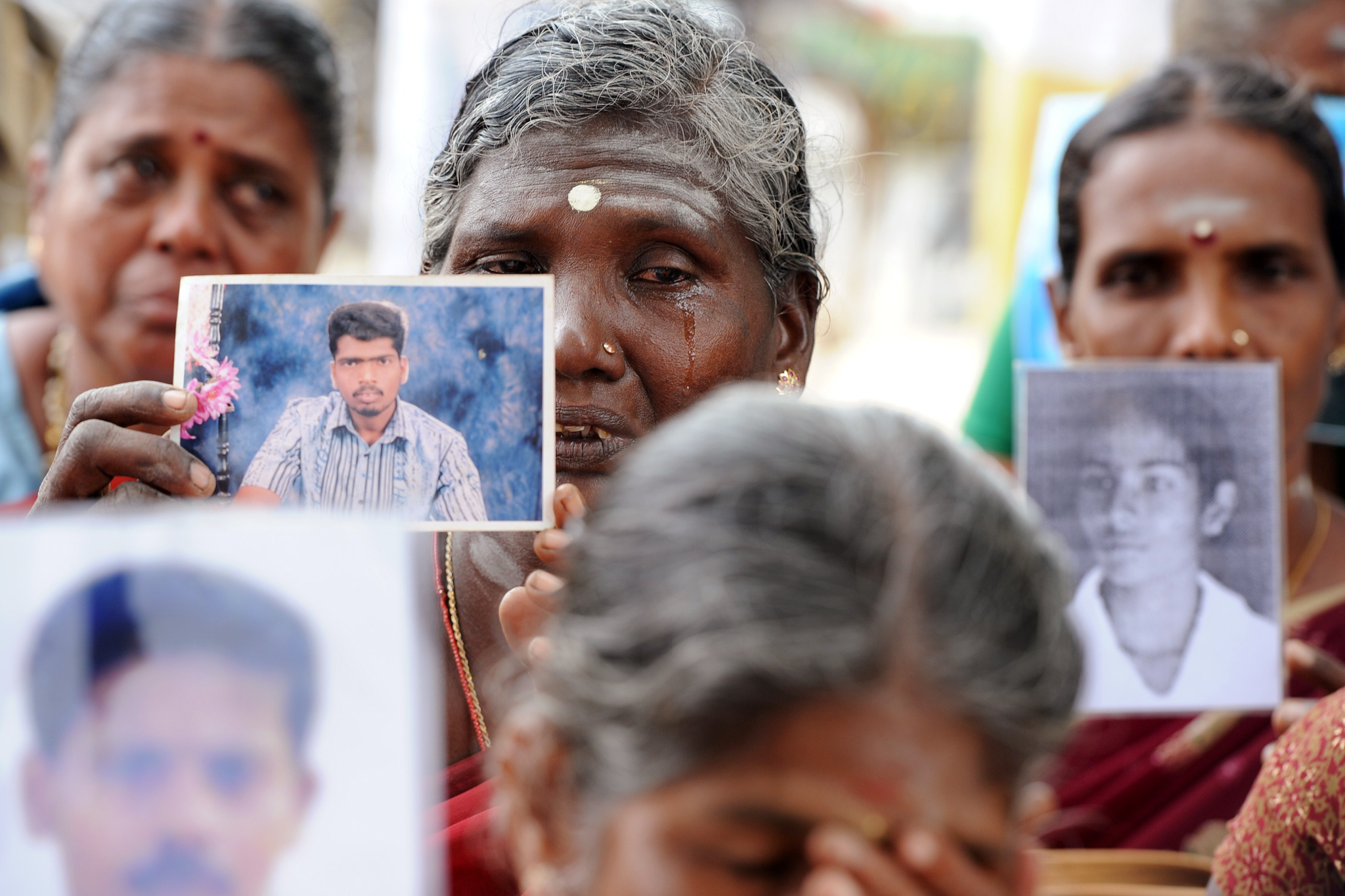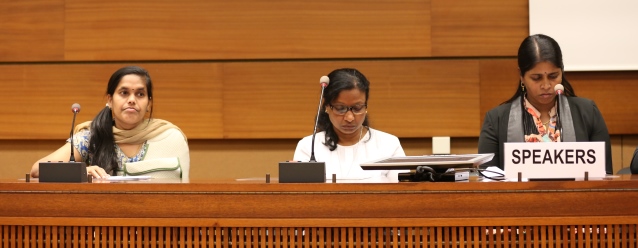( Families of the disappeared call for justice, June 2015, at UNHRC)
Women’s Action Network (WAN) welcomes the OISL report presented on Wednesday to the 30th session of the UNHRC by the High Commissioner for Human Rights. We fully endorse the attention brought to sexual violence and the forceful call to end impunity.
OISL report covers variety of violations, a number of which WAN worked on in the past. But this statement focuses on sexual violence.
For years, WAN and other women’s groups from the north and the east have asked successive Sri Lankan governments and the international community to investigate and address sexual vio-lence against Tamil women during and after the armed conflict. The OISL and HC’s reports shed light on the gravity of the problem and underscore the urgent need to fight the culture of impunity.
The OISL report describes cases in which security forces stripped Tamil women naked, put chili powder on their genitals, burned their breasts, used pliers to squeeze their breasts, inserted barbed wire and ice cubes into the anus, raped and gang-raped them (including while uncon-scious), and forced them to have oral sex. Perpetrators ranged from low-level guards to senior offices in all branches of the security forces (TID, CID, SLA, Navy, Military Intelligence, Na-tional Intelligence Bureau).
OISL concluded: [I]ncidents of sexual violence were not isolated acts but part of a deliberate policy to inflict torture (to obtain information, intimidate, humiliate, inflict fear). The practices followed similar patterns, using similar tools … reinforcing the conclusion that it was part of an institutional policy within the security forces.

The 30 testimonies cited in the OISL report are just the tip of the iceberg. The HC’s report con-cluded that rape and sexual violence by the security forces were “widespread.” Yet, as OISL noted, “[n]ot one single perpetrator of sexual violence in relation to the armed conflict is so far known to have been convicted,” and “the Government has consistently sought to deny or play down the gravity of the allegations of rape and other forms of sexual violence by the security forces.”
We seem to live in a society today that turns a blind eye to the heinous crimes of sexual violence. We hear of babies as young as 8 months and 5 years old being raped and killed in this country.On a daily basis we hear of rapes, murder and the mutilation of women’s bodies and grave forms of violence against children. Such levels of violence are a testament to the erosion of basic norms and values in our society which has resulted in immunity for sexual predators. The law enforcement agencies and judiciary are tardy and gender insensitive.
In this context, WAN fully endorses the High Commissioner’s call for the establishment of a hybrid special court, with robust international involvement. This must be backed up by a credible and acceptable victim and witness protection mechanism that works at the ground level. WAN knows through experience that a domestic mechanism to investigate sexual violence by the security forces will not deliver justice. To take just one example, consider the Vishavamadhu rape case (Case no. 1569/12). Despite uncontested evidence (including DNA tests) that four military men gang-raped a returning Tamil IDP woman, the case has dragged since June 2010. The accused rapists were released on bail, and at least one left the country. Meanwhile, the victim is repeatedly harassed, beaten, and threatened to keep silent.
This is not just a question of the past. In the last few weeks, WAN has lodged a complaint with the Human Rights Commission, alleging that police officers perpetrated sexual torture (including vaginal penetration with a metal rod) against a single Tamil mother from the Vanni. WAN members and other women’s groups continue to be watched, harassed, and visited at their office by CID and TID officers inquiring about our work. The latest such incident was on 07th Sept 2015.
TID, CID, and Army officers continue to harass families of the disappeared and those helping them. Former political prisoners are subjected to frequent visits by the CID, police, and Army upon their release. The high levels of harassment and continuing surveillance give rise to a cli-mate and culture in which sexual violence is allowed to continue. If the current government is genuine in its commitment to end impunity for sexual violence, it must disband the surveillance structures currently in place.
When he was opposition leader, Prime Minster Ranil Wickramasighe appointed a commission to look into violence against women. He is now duty-bound to implement the recommendations of his own commission , which made detailed findings on sexual violence against Sri Lankan women by men in power.
Therefore, we call on the Government of Sri Lanka to:
1. Implement a comprehensive victim and witness protection mechanism that takes into account ground realities, including harassment, surveillance, and intimidation by state agents. Engage in consultations to understand the problems and develop credible solutions to protect victims and witnesses.
2. Create a hybrid special court with international judges, prosecutors, lawyers, experts, and investigators to investigate and prosecute sexual and gender-based violence alleged during and right after the armed conflict. Draft appropriate legislation to allow the court to prosecute sexual violence as war crimes and crimes against humanity, to reflect the widespread scale, systematic nature, and institutional policy motivating these crimes.
3. Create a specialized panel within the hybrid court to hear all pending cases related to sexual violence and torture, prosecute perpetrators, recommend psychosocial support, and grant com-pensation. Ensure that the panel, prosecutors, experts, and staff have specialized training in in-vestigating sexual violence in conflict. Incorporate video- conferencing technology and other means for securely gathering and presenting evidence. Establish a special victim and witness protection unit for victims of sexual violence, apart from broader witness protection schemes in place.
4. Vet all Sri Lankan security forces and dismiss those credibly alleged to have engaged in sexual violence and other human rights abuses. We also endorse the OISL recommendation to vet all security forces wishing to serve in UN peacekeeping missions and call on the government to credibly and transparently investigate current allegations of sexual abuse by Sri Lankan peacekeepers, especially in Haiti, before allowing any further deployments.
5. Invite the Special Representative of the Secretary-General on conflict-related sexual violence and the Special Rapporteurs on extrajudicial killings and torture to visit Sri Lanka in the coming months.
6. Above all, engage in extensive consultation and continuous outreach with women’s groups and war-affected communities to shape processes for truth, justice, reparations, and guarantees of non-recurrence for sexual and gender-based violence in conflict.
Issued by *Women’s Action Network is a collective of eight women’s groups that are working in the north and the east.
